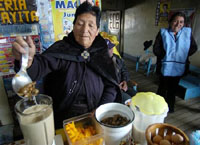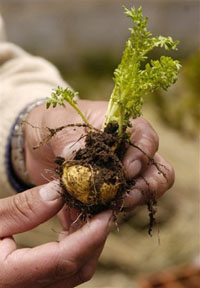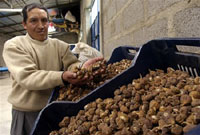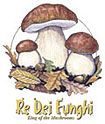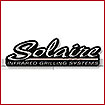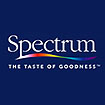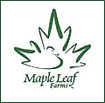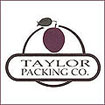Peruvian Root in Bioprospecting Dispute
By
RICK VECCHIO
|
| (AP)
Timotea Cordova , 80, prepares a traditional
elixir to ward off the breathless
effect of the high... |
JUNIN,
Peru (AP) - In a small storefront on a
bleak, wind-swept Andean plateau, Timotea
Cordova offers an oxygen-deprived visitor
a traditional elixir to ward off the breathless
effect of the high altitude.
Dropping a few shriveled tuber roots into
a blender, the 80-year-old, Quechua Indian
shopkeeper promises with a playful glance
that the concoction will also provide
a leg up later in the bedroom.
For hundreds of years, Quechua Indians
have grown maca, the frost-resistant root
that thrives in these frigid Andean highlands,
to boost stamina and sex drive. The root,
they believe, is nature's bounty and belongs
to everyone and to no one in particular.
Maca growers and indigenous organizations
were outraged when, in 2001, a New Jersey-based
company, PureWorld Botanicals, received
a U.S. patent for exclusive commercial
distribution of an extract of maca's active
libido-enhancing compounds that it branded
as MacaPure.
Peruvian officials called the patent an
"emblematic case" of biopiracy
and are preparing to challenge it in U.S.
courts.
The maca dispute is just the latest collision
between indigenous people and commercial
interests over so-called biological prospecting,
the growing practice of scouring the globe
for exotic plants, microbes and other
living things ripe for commercial exploitation.
Bioprospecting has huge potential for
good, say researchers who go to sea, climb
mountains and trek to obscure corners
of the world in search of exotic and undiscovered
life.
A 2005 U.N. University report concluded
that 62 percent of all cancer drugs were
created from bioprospecting discoveries.
The venom of a deadly sea snail found
off the coast of the Philippines led Elan
Pharmaceuticals Inc. to develop the painkiller
Prialt, which U.S. regulators approved
in 2004. The key ingredient in the breast
cancer drug Taxol owned by Bristol-Myers
Squibb Co. (BMYP)
is
taken from the bark of the yew tree, and
Wyeth's kidney transplant drug Rapamune
comes from Easter Island soil.
|
| ((AP)
A local farmer shows a maca plant
in Junin, Peru, Nov. 1, 2006. For
hundreds of years, Quechua... |
But
bioprospecting is mostly unregulated and
there are mounting calls to establish
legal frameworks for such work.
The Convention on Biological Diversity
produced at the 1992 Earth Summit in Rio
de Janeiro entitled nations to a share
of the profits from substances yielded
by their flora and fauna. It was ratified
by 188 countries - but not the United
States, which argues that such a requirement
stifles innovation and would undermine
the patent system.
That hasn't stopped some of the world's
poorest countries, which also hold the
richest pockets of natural biodiversity,
from fighting to apply the convention
to international patent law.
India has had the most success, most recently
persuading the European Patent Board of
Appeals to invalidate a 1994 patent granted
to U.S.-based W.R. Grace & Co. (GRA)
for an insecticide derived from neem seeds.
Peru and Brazil, both at the forefront
of the biopiracy debate, have been less
persuasive.
|
| (AP)
A farmer shows dry maca in Junin,
Peu, Nov. 1, 2006. For hundreds of
years, Quechua Indians have... |
Full
ImageBrazil, which has some of the world's
strictest regulations to prevent the removal
of genetic materials from the Amazon,
has been hard-pressed to demonstrate a
single case of biopiracy before the World
Trade Organization.
Attempts by Peruvian indigenous groups,
meanwhile, ultimately failed to overturn
U.S. patents based on ayahuasca, a hallucinogenic
plant used for centuries in religious
and healing ceremonies, and nuna, a nutritious
Andean bean that pops when toasted.
Peru hopes the MacaPure dispute will become
a pivotal case in attempts to require
all patent applications to disclose the
source of genetic materials.
Alejandro Argumedo, a Quechua Indian agronomist
and activist, says the French company
that bought PureWorld in 2005, Naturex,
has no right to "privatize knowledge
that belongs to an entire region."
Naturex's marketing manager, Antoine Dauby,
says the company acknowledges that maca's
beneficial properties were long ago discovered
by indigenous Peruvians. He says its patent
lets them "grow, sell and use maca
as they have for centuries."
"Our patent is for the extraction
and isolation of maca's key ingredient
- and nothing else," said Dauby.
As a good faith gesture, he said, Naturex
is offering to grant free licenses to
Peruvian companies to use MacaPure in
their products.
Qun Yi Zheng, PureWorld's former president
and chief scientist, says the company
invested more than $1 million and three
years of research in the endeavor and
that it popularized maca as a worldwide
Peruvian export.
Peruvians "should not be so narrow-minded,"
Zheng said, but should instead be grateful.
"After we studied it, put money into
the research, (maca) has become a useful
commodity."
A wide range of potency peddling maca-based
products - from powders and pills to jams
and candies - have helped triple Peru's
exports of the plant from $1.3 million
in 2000 to more than $3 million annually
since 2003, according to the Exporters
Association of Peru.
Japan was Peru's biggest maca customer
in 2005, followed by the United States,
Germany, Belgium and Canada.
Zheng's peer-reviewed study, published
in the journal Urology in April 2000,
showed that MacaPure greatly improved
penile dysfunction in castrated rats.
Also, lab mice fed the stuff for 22 days
engaged in sexual intercourse up to 67
times in a three-hour period, compared
with 16 times by less randy rodents deprived
of the extract.
Peru contends PureWorld's alcohol-based
extraction process simply mimics the centuries-old
practice by Andean people of soaking dried
maca root in Andean moonshine to release
the libido boosters.
But providing scientific proof to show
PureWorld's formula falls short of a "novel"
and "useful" invention has proven
elusive.
"We don't have the technology for
this analysis and we have had to turn
to a scientist in the United States who
offered to do the analysis for free,"
said Manuel Ruiz, a director at the nonprofit
Peruvian Society for Environmental Law
and a member of Peru's National Anti-Biopiracy
Commission.
Peru has also enlisted the pro bono help
of Washington attorney Jorge Goldstein
to prepare a legal challenge. He is examining,
among other things, archives from rural
Peruvian universities to demonstrate that
the U.S. Patent and Trademark Office failed
to consider "prior art" - pre-existing
knowledge that could be used to overturn
the patent.
Chris Kilham, who conducted the initial
field research for MacaPure in the Peruvian
highlands, says he can see the issue from
both sides.
"PureWorld, which did all of this
work, found compounds that nobody knew
existed before," said Kilham, a professor
of ethnobotany at the University of Massachusetts
at Amherst.
"On the other hand, the native people
from whom the knowledge of especially
the sexual applications of maca arise
were not at all considered in these patents."
The specter of biopiracy in Peru dates
back to the 1630s, when Jesuit priests
took bark from the Peruvian cinchona tree
- the original source of quinine - back
to Europe, where it was hailed as a miracle
cure for malaria.
Peru never got wealthy from the discovery.
Cinchona seeds were smuggled by the Dutch
from Peru in the 19th century and planted
in Java. Indonesia became the world's
primary source of quinine.
The image of the cinchona tree was put
on the Peruvian flag - a constant reminder
of Peru's unrewarded contribution to one
of the most important breakthroughs in
medical history.
AP
Biotechnology Writer Paul Elias contributed
to this story from San Francisco
Google
sponsored links
Maca - Low Prices on Products Containing
Maca Fast Shipping! WebVitamins.com
Maca Root Capsules - 60ct. $9.95 - Buy
3 and get 1 free! Manufacturer direct
savings to you. www.AmerMed.com
Potent Fresh Organic Maca - Sale! 100
Capsules Only $7.49 Bulk Organic Maca
Powder $29.95/Kg. www.therootofthematter.ca



